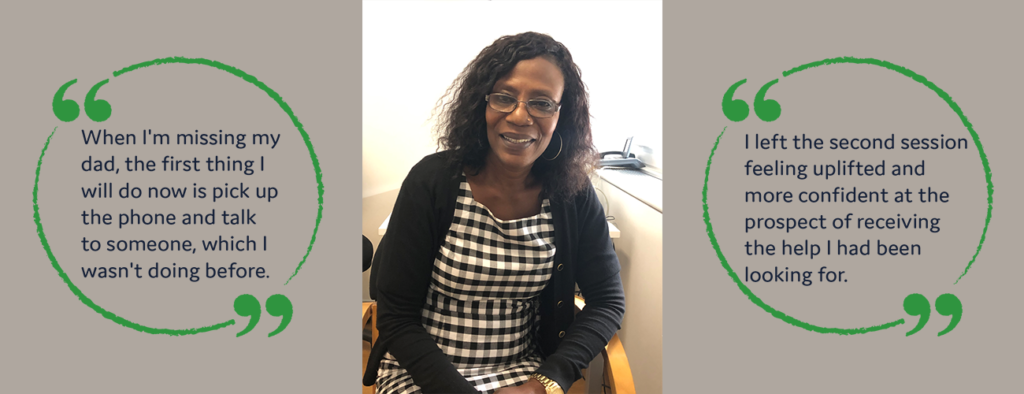
How Counselling Helps with Grief

Grief often comes in ebbs and flows but it can be particularly painful around Christmas time. After experiencing grief for many years, Grace spoke to one of our counsellors from the Talking Therapies service. Georgina encouraged her to reach out to and accept support from loved ones when coping with the impacts of a bereavement.
What difficulties led to you being referred to CLW Talking Therapies?
I had accessed the Community Living Well service before and received low intensity CBT treatment. This therapeutic intervention helped me with my worries and negative thoughts. CBT had also increased my daily movements through introducing me to gardening. After the course ended, I was fine up until the run up to Christmas 2018. It was then that I started to not feel like myself. I was easily distracted, restless, getting upset, having sleepless nights.
Negative thoughts about people were plaguing my mind. I felt unable to trust others and was experiencing a constant fear that people were going to hurt and upset me. This left me feeling hopeless and useless and I couldn’t talk to people without crying. I went to my GP who asked me a few questions and then gave me some questionnaires. She was the first person to say to me “You have depression and anxiety and I will refer you for support.”
What happened after you were referred?
I got the triage call where they assessed me over the phone. It was difficult to talk about myself, but they were understanding and sympathetic to my situation. They felt counselling was more appropriate as my issues were related to what had happened in my past and its impact on me now.
How did you find counselling?
After my first counselling session, I didn’t want to come back again because I found it hard to talk to a stranger. However, I persevered and turned up the next week and consolidated what we discussed the week before.
I left the second session feeling uplifted and more confident at the prospect of receiving the help I had been looking for. By the third week I felt more relaxed and less tearful.
Did counselling help with your grief?
Without a shadow of a doubt. I started to feel much lighter, like a huge weight had been lifted off my shoulders. I realised how much I’d gone through after talking about things that I’d never told anyone. When you confide in someone else it feels like a confession, you start to realise the load you’ve been carrying on your back.
What has the effect been like on your self-esteem?
That I’m not a bad person. I’ve got good friends around me, people I can talk to. I also noticed that I was always putting myself down and feeling worthless. I never felt like I was doing enough for others, but by the end of the course I started to realise that I was doing enough, and that it’s okay to accept support from others.
A pattern began to emerge as I noticed that my depression tends to crop up in the run up to Christmas. In the past 2-3 years I can see that Christmas has been a trigger for a dip in my mood. It is when I miss my Dad the most and wish that he was still alive so that we could be in Ghana, going to church in our new clothes. I’ve learnt that talking really helps. When I’m missing my Dad the first thing I will do now is pick up the phone and talk to someone, which I wasn’t doing before.
Do you have a plan for maintaining your progress?
I live an active life; I’ve been walking and keeping in touch with friends regularly. If I feel sad, I no longer wait for someone to come to my rescue by phoning me. Instead, I call them to say hello. I’ve lost friends in the past because I didn’t feel like I could talk to anyone. I’ve now spoken to people about my depression and anxiety and even though they were surprised, it makes them more determined to reach out if they haven’t heard from me.
What advice would you give others whose grief are complicated by psychological issues?
Please don’t wait until you’re feeling really low and tearful, go and ask for help. There’s nothing to be ashamed of, all you need to say is, ‘I need help,’ and briefly describe your symptoms. Your GP will be able to work out how they can help you.
If you are experiencing issues related to grief…
Refer yourself to the Talking Therapies service, please fill out the form available here.
To learn more about the Talking Therapies service, click here
This story was originally published in the Autumn 2019 edition of the Community Living Well magazine. It has been edited for website purposes. Subscribe today to receive inspirational stories of recovery, just like Jenny and Steven’s, straight to your inbox, four times a year!
Author: Tamsin Cogan
Posted on: 14th October 2019



